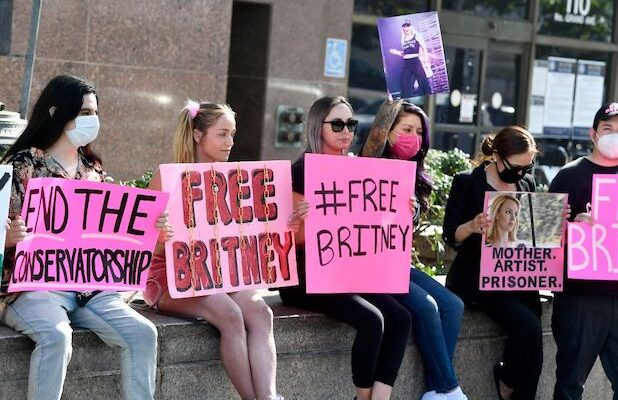
#FreeBritney means a lot more than freeing Britney Spears
The conservatorship that’s kept the pop icon isolated has spawned necessary conversations around reproductive rights.
On Wednesday, June 23, Britney Spears, the child star turned pop icon, spoke for 20 minutes to a Los Angeles Superior Court judge via telephone about the way her years-long conservatorship has impacted her life.
Much of her testimony about the conservatorship revealed that Spears has had little to no authority over her own finances as well as many other aspects of her life.
For 13 years, the pop star, who is now 39-years-old, has been subject to constant surveillance and a lack of privacy, a grueling workload, and multiple restrictions hindering her from making decisions for herself.
One detail in particular though — that she is not able to take out her intrauterine device (IUD) — has shocked her fanbase and sparked conversations about reproductive and disability rights.
Britney Spears being held under a 13-year conservatorship and being forced to keep her IUD in despite the fact that she wants another child is where disability rights and reproductive rights intertwine.
— Sarah Lerner (@SarahLerner) June 23, 2021
In Wednesday’s testimony, Spears’ spoke of having an IUD to prevent pregnancy, but said she would like to remove it so she can get married and try to have another baby.
“I wanted to take the IUD out, so I can start trying to have another baby, but this so-called team won’t let me go to the doctor to take it out because they don’t want me to have any more children,” she said.
Details of the widely-viewed testimony circulated quickly on social media, where 1 million tweets about Spears were published in the span of 24 hours.
Much of the conversation was centered around the issues of disability rights and reproductive justice, two topics that have an atrocious history in the U.S.
In an interview with USA Today, disability rights activists Rebecca Cokley said that Spears experienced “the nexus of sexism and sanism in the public eye and now the court system.”
Cokley said that denying Spears the right to be a parent, the right to work or not, and the right to bodily autonomy for over a decade is a “public policy failure,” and that these issues are all too common for people with mental illness and developmental disabilities.
.@BradJenkins talks the #BritneySpears situation and how it directly affects the disability community and the battles they fight every day. #CrossConnection pic.twitter.com/5gWRkDXvXW
— The Cross Connection with Tiffany Cross (@CrossConnection) June 26, 2021
According to Judy Mark, president of Disability Voices United, a person under a conservatorship has “fewer rights than someone who is in prison.”
“They cannot make even the most basic choices in their lives, like who they spend time with, where they live, who they can have a relationship with,” Mark told USA Today.
Spears’ conservatorship began in 2008 after she experienced a very public mental health crisis the year before. She has spoken out against her father, James Spears, who has been co-managing the conservatorship since the start. In 2020, Spears told a judge via her lawyer that “she is afraid of her father.”
Advocates on social media have been making people aware that for many disabled people, these limitations are not unheard of.
UK-based writer and performer, Siobhán Carroll, wrote on Twitter that Spears’ case highlights a reality that many disabled people face, a reality in which “choices and decisions [are] taken out of our hands ‘for our own good'.”
RELATED CONTENT
Florida Attorney and neurodiversity expert Haley Moss made the point to say that the cultural #FreeBritney movement also means liberation for all disabled people living under oppressive restrictions.
“Disabled adults end up in unwanted/unnecessary conservatorships. Free Britney means free us all,” Moss tweeted.
Robyn Powell, a professor at Stetson University College of Law, told USA Today that she has personally experienced attempts to control her reproductive freedom, simply due to her status as a disabled woman.
“As a woman with a significant disability, I have been offered a hysterectomy more times than I can count. This has been done based on assumptions about my reproductive desires rather than medical necessity,” Powell said.
Spears’ situation is also representative of a bigger issue within American society that involves misogyny and regulating the reproductive choices of those deemed “able-bodied,” or otherwise worthy of reproducing.
For example, in 1927, in Buck v. Bell, the Supreme Court found that a Virginia law allowing for Carrie Buck to be sterilized was not unconstitutional. Buck, at the time, was receiving treatment in a mental institution.
The Supreme Court's ruling in Buck v. Bell had profound consequences.
— ACLU (@ACLU) June 25, 2021
Between 1907 and 1945, upwards of 70,000 people — overwhelmingly poor people of color — were sterilized involuntarily under eugenic sterilization laws.
Sam Crane, legal director of the Autistic Self Advocacy Network, told USA Today that the U.S has a very long history of forced sterilizations, especially of women of color – “with disabilities or perceived disabilities."
As recently as September 2020, it was discovered that undocumented immigrants detained at Irwin County Detention Center in Georgia were facing forced sterilization.
As Cokley explained, Buck v. Bell is still law today, and it “allows the state to sterilize people with disabilities against their will. Britney’s IUD story is the legacy of that case.”
Spears, whether she identifies as disabled or not, deserves to have the freedom to make her own decisions, the freedom to manage her own money, and the freedom to bring new life into the world whenever she feels ready.











LEAVE A COMMENT:
Join the discussion! Leave a comment.